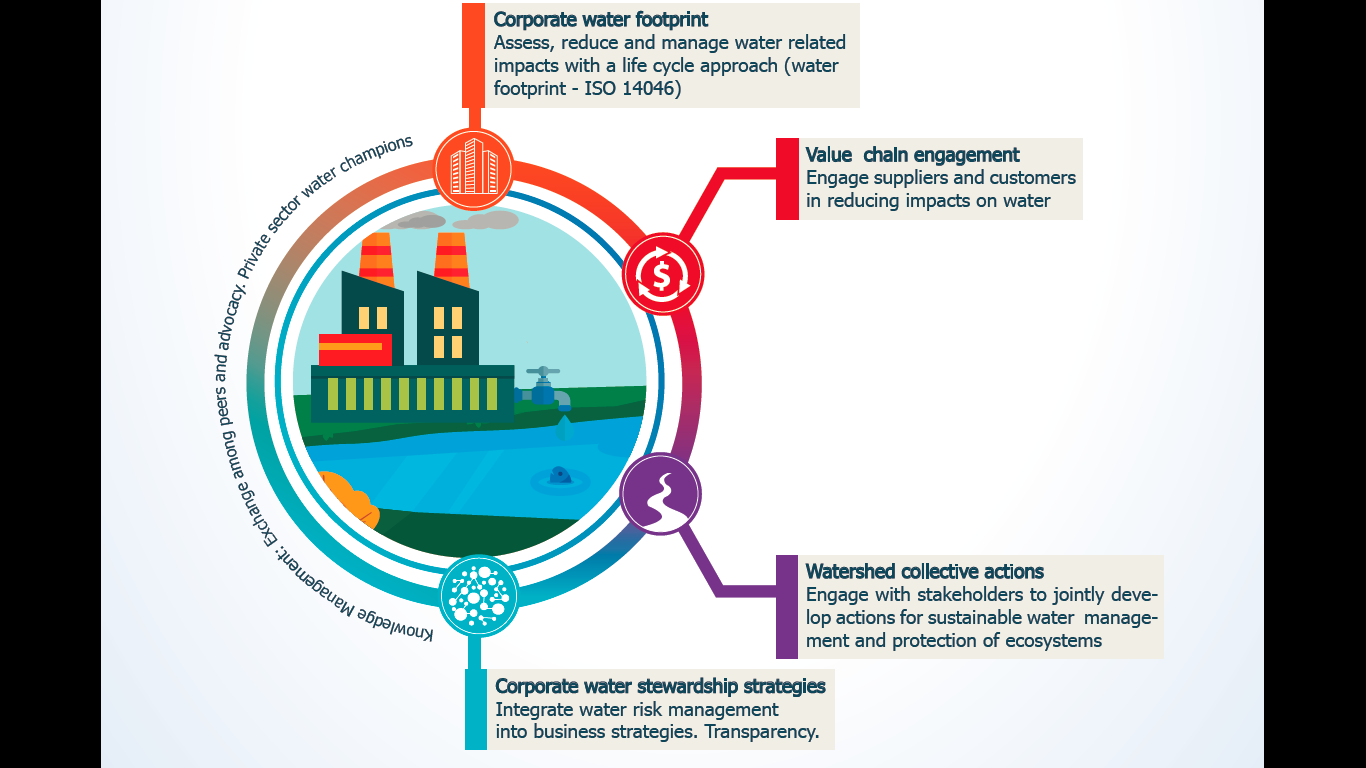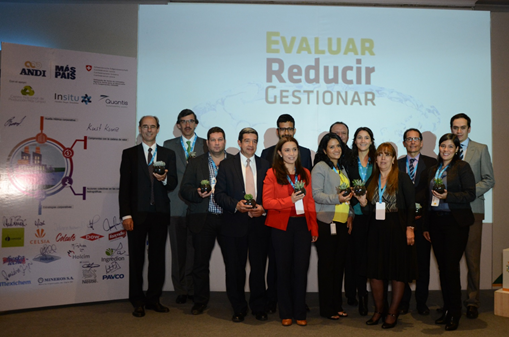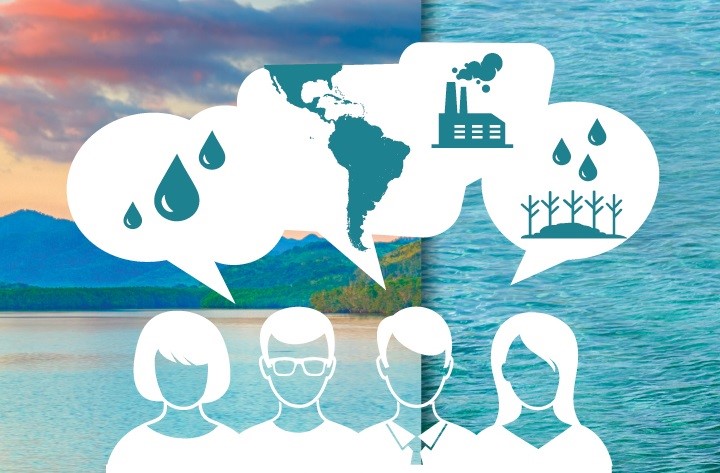Abstract
Population growth, urbanization, and changes in production and consumption patterns have a direct impact on water resources availability. The OECD1 estimates that by 2050, if no new policies are introduced, about 40 percent of the population is projected to be living in river basins experiencing severe water stress and that global water demand is projected to increase by some 55 percent. Thus, it is urgent to take individual but meaningful actions as well as to develop partnerships to improve water management. Video #ValoroElAgua; Valuing water

As follows, we present the work of a public-private partnership among the Swiss government cooperation, companies, national institutions, and business associations. The initiative started in 2010, known as SuizAgua Colombia, and it has scaled up to Peru and Chile, currently also working in knowledge development with Mexico. The initiative aims at developing cases where companies understand and reduce their impacts on water within the production processes, and they also get involved in actions to improve water management at the water basin level. Seven years of capacity building and hands on experience development. The purpose is to contribute to the achievement of the global water goal (Sustainable Development Goal 6), in terms of water use efficiency, improve waste water treatment, and enhance water governance.
Water crisis?
Water is a fundamental resource for life on Earth and for every productive process. Challenges related to population growth, urbanization, and changes in production and consumption patterns; have direct impacts on water resources availability, in terms of quantity and quality. Climate change adds to the challenge by influencing rain regimes and temperatures, and by increasing the frequency and intensity of extreme weather events. The global water goal -- SDG 6 -- within the 2030 Agenda for Sustainable Development, emphasizes the urgency of addressing the global water crisis.
Despite Colombia’s abundant renewable water resources, the country also faces critical water management challenges, such as: i) concentration of the demand (70 percent of its population and industry are based in a territory that only has 13 percent of the area’s total water resources)2; ii) high deforestation rates (between 124.000 to 140.000 hectares per year)3; iii) critical but still unmonitored water pollution; iv) profound social inequality (Colombia is one of the most unequal countries in Latin America, with a Gini Index of 53.54 and a considerable gap between rural and urban areas); and v) rising impacts from climate change and climate variability.

In this context, civil society, public entities, and the private sector must, urgently, assume their responsibility in realizing a sustainable future at the national and global level. The private sector is increasingly aware that water is becoming a substantive risk for their business. Risks related to closure of operations, increased operational costs, reputational damage or lost sales. In that sense, accurate and transparent information about products’ environmental impact (footprint) is required to improve management and appropriate regulations. Thus, recognized and standardized tools are needed. This is the case of water footprint metric(s) under the Life Cycle Assessment approach. It allows monitoring and prioritizing investments for reducing direct and indirect impacts from water uses in the production of goods and services. The water footprint comprises impacts related to: water consumption, pollution, and where and when the water use takes place.
Experience
In Colombia, since 2010, a public-private partnership, facilitated by the Swiss Agency for Development and Cooperation (SDC) through its Global Water Program5, has led to the application of corporate water stewardship principles in order to influence private engagement, reduce impacts on water, and improve outreach.
Key lines of action:
i. Evaluation, monitoring, and reduction of water footprint (based on the ISO 14046);
ii. Motivate and steer companies’ actions on watershed management and engaging with other partners at the water basin; and
iii. Facilitate a Latin American community of practice on water footprint and corporate water stewardship.
In Colombia, 20 cases are being developed with companies from different sectors for the reduction of impacts in direct operations, value chain engagement, and investing in water basin actions. In partnership with the Colombian National Business Association (ANDI), the implementation is delivered by the Colombian National Center for Cleaner Production and Insitu Corporation. Scientific backstopping is provided by Quantis. Besides, with the Center of Analysis of Life Cycle of Mexico (CADIS), a Latin American community practice with professionals in the region working on this matter has been activated. Under the same lines of actions and with remarkable results, the process has been scaled up to Peru and Chile, since 2012.
Key Results

- This initiative is at the forefront of the application of the standard ISO 14046 on Water Footprint (WF). Since 2010, it went from a mostly unknown concept to an applied tool by private sector, public institutions, academia, and research centers.
- Mobilizing interest and investments from the private sector to reduce impacts on water. Showcases available (2010 – 2015): 11 main companies assessed and reduced their impacts (around $2.5 million USD were invested in WF reduction. On the ground actions: implementation of projects on water culture, water harvesting, water treatment, ecosystem restauration, recycling; at the water basin level).
- Between: 2016 to 2019, about 20 companies from different sectors contributed to building business cases; and the Colombian National Business Association has become a leader of the initiative.
- The WF was introduced for the first time in Colombia’s public policy instrument, the National Water Study (ENA).
- Community of practice: facilitate the exchange among experts and practitioners using WF ISO 14046, in the Latin American context. A Guide is available with the agreed recommendations, aiming for stronger concepts and methodological coherence for corporate water footprint application in the region. Professionals from 14 countries contributed to the development of this guide.
- Regional online training on "Water Footprint Assessment -- ISO 14046", in collaboration with Cap-Net UNDP, Quantis and the National Cleaner Production Center.
Challenges
In a globalized economy, the impacts related to the different stages of the life cycle of a product (raw materials and supply chain production, manufacturing, distribution, recycle, reuse, and final disposal) appear distant for the consumers. Therefore, the responsibilities are scattered while environmental and social impacts increase and global inequities are deepened. Strong public awareness is required to meet global water challenges, such as assuring equitable access, using water efficiently, treating effluents safely, and preserving ecosystems. Transformation comes from engaging in water management in our territory and comprehending key impacts of the products we use and consume. Both, companies and consumers, should make decisions based on environmental and social performance of products and services. In that sense, standardized and transparent information improves knowledge and reaching sustainable production and consumption patterns towards an economy where resources are further valued and wastes and impacts reduced at maximum (circular economy).
Experiences are needed to showcase how reducing impacts and water related risks, in a company, becomes an investment in business sustainability. In Colombia, it is vital to scale up this perspective within the private sector in order to make the information available on good practices, appropriate technologies, and economic and social gains. Furthermore, exchanges with other countries could speed up the process among peers.
A viable future means we realize and strongly mobilize for water’s true value, as a vital and irreplaceable resource.
Author Bio
Diana Rojas Orjuela
Latin America regional advisor on water economics
Global Program Water - Swiss Agency for Development and Cooperation (SDC)
Swiss Embassy in Colombia
Footnotes
- Estudio Nacional del Agua, IDEAM 2015 http://documentacion.ideam.gov.co/openbiblio/bvirtual/023080/023080.html
- http://www.ideam.gov.co/web/sala-de-prensa/noticias/-/asset_publisher/96oXgZAhHrhJ/content/la-cifra-de-deforestacion-en-colombia-2015-reporta-124-035-hectareas-afectada
- http://data.worldbank.org/indicator/SI.POV.GINI
- https://www.shareweb.ch/site/Water/about-the-reseau/global-programme-water-initiatives


